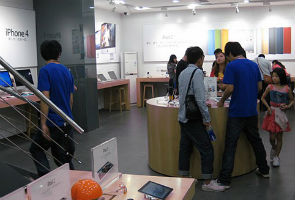China's passion for iPads and iPhones has triggered widespread cloning and even brawls. Now, it has gone further with a fake Apple store so convincing even the staff think they work for Steve Jobs.
The store, in the southwestern city of Kunming, was uncovered by an American blogger who was initially fooled, before she noticed not everything was as it seemed.
At first glance, the signs, computers and layout of the shop all look exactly like a genuine Apple store, says the blogger, who posts under the name BirdAbroad.
Photos posted by the blogger show the employees wearing Apple's trademark blue T-shirts with name badges hanging around their necks.
But a closer look reveals the winding stairs going up to the chill-out area are poorly made, the walls have not been painted well, and the shopfront sign says "Apple Store" whereas the real deal just sports the now-famous fruit logo.
The employees, meanwhile, all genuinely believe they work for Apple, said BirdAbroad, who asked to remain anonymous when contacted by AFP on Thursday.
"I do not know if the computers were real or fake -- they seemed real, but it can be hard to tell," she said. "As of last night, the store was still open."
She added that a quick walk around the corner revealed two other rip-off Apple stores -- one of which sported a sign saying "Apple Stoer".
The Apple website lists four official stores in China -- two in Beijing and two in Shanghai, and none in Kunming.
It has a list of approved retailers that sell its products, but none of those in Kunming corresponds to the fake store's address, according to the blogger.
A spokeswoman for Apple China declined to comment when contacted by AFP.
China is home to the biggest counterfeit market in the world, and despite repeated government pledges to root out fake goods, these are still widely available throughout the country.
As the craze for all things Apple slowly spreads around China, fake iPhones and iPods have also emerged.
The news, however, is unlikely to have an impact on the US-based IT giant, which on Tuesday posted record sales and profits in the recent quarter as sales of iPhones and iPads more than doubled, helped by huge demand in Asia.
The store, in the southwestern city of Kunming, was uncovered by an American blogger who was initially fooled, before she noticed not everything was as it seemed.
At first glance, the signs, computers and layout of the shop all look exactly like a genuine Apple store, says the blogger, who posts under the name BirdAbroad.
Photos posted by the blogger show the employees wearing Apple's trademark blue T-shirts with name badges hanging around their necks.
But a closer look reveals the winding stairs going up to the chill-out area are poorly made, the walls have not been painted well, and the shopfront sign says "Apple Store" whereas the real deal just sports the now-famous fruit logo.
The employees, meanwhile, all genuinely believe they work for Apple, said BirdAbroad, who asked to remain anonymous when contacted by AFP on Thursday.
"I do not know if the computers were real or fake -- they seemed real, but it can be hard to tell," she said. "As of last night, the store was still open."
She added that a quick walk around the corner revealed two other rip-off Apple stores -- one of which sported a sign saying "Apple Stoer".
The Apple website lists four official stores in China -- two in Beijing and two in Shanghai, and none in Kunming.
It has a list of approved retailers that sell its products, but none of those in Kunming corresponds to the fake store's address, according to the blogger.
A spokeswoman for Apple China declined to comment when contacted by AFP.
China is home to the biggest counterfeit market in the world, and despite repeated government pledges to root out fake goods, these are still widely available throughout the country.
As the craze for all things Apple slowly spreads around China, fake iPhones and iPods have also emerged.
The news, however, is unlikely to have an impact on the US-based IT giant, which on Tuesday posted record sales and profits in the recent quarter as sales of iPhones and iPads more than doubled, helped by huge demand in Asia.

No comments:
Post a Comment